4 Dante’s Inferno Canti 1-2
Canto 1
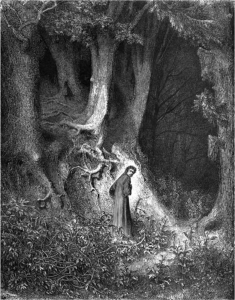
MIDWAY upon the journey of our life[1]
I found myself within a forest dark,[2]
For the straightforward pathway had been lost.
Ah me! how hard a thing it is to say
What was this forest savage, rough, and stern,
Which in the very thought renews the fear.
So bitter is it, death is little more;
But of the good to treat, which there I found,
Speak will I of the other things I saw there.
I cannot well repeat how there I entered,
So full was I of slumber at the moment
In which I had abandoned the true way.
But after I had reached a mountain’s foot,[3]
At that point where the valley terminated,[4]
Which had with consternation pierced my heart,
Upward I looked, and I beheld its shoulders
Vested already with that planet’s rays[5]
Which leadeth others right by every road
Then was the fear a little quieted
That in my heart’s lake had endured throughout[6]
The night, which I had passed so piteously
And even as he, who, with distressful breath,
Forth issued from the sea upon the shore,
Turns to the water perilous and gazes;
So did my soul, that still was fleeing onward,
Turn itself back to re-behold the pass
Which never yet a living person left.[7]
After my weary body I had rested,
The way resumed I on the desert slope,
So that the firm foot ever was the lower.[8]
And lo! almost where the ascent began,[9]
A panther light and swift exceedingly,[10]
Which with a spotted skin was covered o’er!
And never moved she from before my face,
Nay, rather did impede so much my way,
That many times I to return had turned.[11]
The time was the beginning of the morning,
And up the sun was mounting with those stars[12]
That with him were, what time the Love Divine
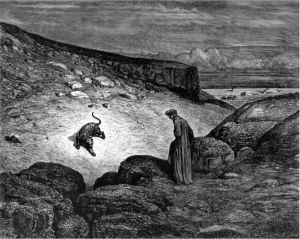
At first in motion set those beauteous things;
So were to me occasion of good hope,
The variegated skin of that wild beast,
The hour of time, and the delicious season;
But not so much, that did not give me fear
A lion’s aspect which appeared to me.[13]
He seemed as if against me he were coming
With head uplifted, and with ravenous hunger,
So that it seemed the air was afraid of him;[14]
And a she-wolf, that with all hungerings[15]
Seemed to be laden in her meagreness,
And many folk has caused to live forlorn!
She brought upon me so much heaviness,
With the affright that from her aspect came,
That I the hope relinquished of the height.
And as he is who willingly acquires,
And the time comes that causes him to lose,
Who weeps in all his thoughts and is despondent,
E’en such made me that beast withouten peace,
Which, coming on against me by degrees
Thrust me back thither where the sun is silent[16]
While I was rushing downward to the lowland,
Before mine eyes did one present himself,
Who seemed from long-continued silence hoarse.[17]
When I beheld him in the desert vast,
“Have pity on me,” unto him I cried,
“Whiche’er thou art, or shade or real man!”
He answered me: “Not man; man once I was,
And both my parents were of Lombardy,
And Mantuans by country both of them.
Sub Julio was I born, though it was late,[18]
And lived at Rome under the good Augustus,
During the time of false and lying gods.
A poet was I, and I sang that just
Son of Anchises, who came forth from Troy,
After that Ilion the superb was burned
But thou, why goest thou back to such annoyance?
Why climb’st thou not the Mount Delectable
Which is the source and cause of every joy?”
Now, art thou that Virgilius and that fountain[19]
Which spreads abroad so wide a river of speech?”
I made response to him with bashful forehead.
“O, of the other poets honour and light,
Avail me the long study and great love
That have impelled me to explore thy volume!
Thou art my master, and my author thou,
Thou art alone the one from whom I took
The beautiful style that has done honour to me.[20]
Behold the beast, for which I have turned back;
Do thou protect me from her, famous Sage,
For she doth make my veins and pulses tremble.”
Thee it behoves to take another road,”
Responded he, when he beheld me weeping,
“If from this savage place thou wouldst escape;
Because this beast, at which thou criest out,
Suffers not any one to pass her way,
But so doth harass him, that she destroys him;
And has a nature so malign and ruthless,
That never doth she glut her greedy will,
And after food is hungrier than before.
Many the animals with whom she weds,
And more they shall be still, until the Greyhound[21]
Comes, who shall make her perish in her pain.
He shall not feed on either earth or pelf,
But upon wisdom, and on love and virtue;
‘Twixt Feltro and Feltro shall his nation be;
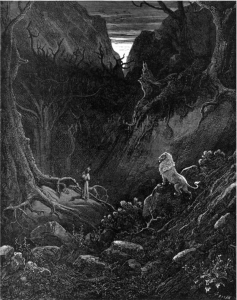
Of that low Italy shall he be the saviour,[22]
On whose account the maid Camilla died,
Euryalus, Turnus, Nisus, of their wounds;
Through every city shall he hunt her down,
Until he shall have driven her back to Hell,
There from whence envy first did let her loose.
Therefore I think and judge it for thy best
Thou follow me, and I will be thy guide,
And lead thee hence through the eternal place,
Where thou shalt hear the desperate lamentations,[23]
Shalt see the ancient spirits disconsolate,
Who cry out each one for the second death;
And thou shalt see those who contented are
Within the fire, because they hope to come,
Whene’er it may be, to the blessed people;
To whom, then, if thou wishest to ascend,
A soul shall be for that than I more worthy;[24]
With her at my departure I will leave thee;
Because that Emperor, who reigns above,
In that I was rebellious to his law,
Wills that through me none come into his city.
He governs everywhere and there he reigns;
There is his city and his lofty throne;
O happy he whom thereto he elects!”
And I to him: “Poet, I thee entreat,
By that same God whom thou didst never know,
So that I may escape this woe and worse,
Thou wouldst conduct me there where thou hast said,
That I may see the portal of Saint Peter,
And those thou makest so disconsolate.”
Then he moved on, and I behind him followed.
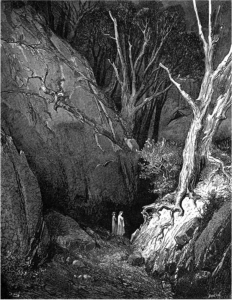
Canto 2
DAY was departing, and the embrowned air
Released the animals that are on earth[25]
From their fatigues; and I the only one
Made myself ready to sustain the war,
Both of the way and likewise of the woe,
Which memory that errs not shall retrace.
O Muses, O high genius, now assist me!
O memory, that didst write down what I saw,
Here thy nobility shall be manifest!
And I began: “Poet, who guidest me,
Regard my manhood, if it be sufficient.
Ere to the arduous pass thou dost confide me.
Thou sayest, that of Silvius the parent,[26]
While yet corruptible, unto the world
Immortal went, and was there bodily.
But if the adversary of all evil
Was courteous, thinking of the high effect
That issue would from him, and who, and what,
To men of intellect unmeet it seems not;
For he was of great Rome, and of her empire
In the empyreal heaven as father chosen;
The which and what, wishing to speak the truth,
Were stablished as the ho]y place, wherein
Sits the successor of the greatest Peter.[27]
Upon this journey, whence thou givest him vaunt,
Things did he hear, which the occasion were
Both of his victory and the papal mantle.
Thither went afterwards the Chosen Vessel,
To bring back comfort thence unto that Faith,
Which of salvation’s way is the beginning.
But I, why thither come, or who concedes it?
I not Aenas am, I am not Paul,
Nor I, nor others, think me worthy of it.
Therefore, if I resign myself to come,
I fear the coming may be ill-advised;
Thou’rt wise, and knowest better than I speak.”
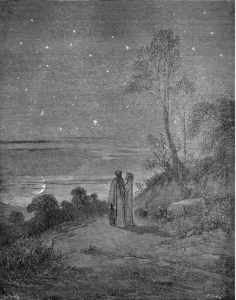
And as he is, who unwills what he willed,
And by new thoughts doth his intention change,
So that from his design he quite withdraws,
Such I became, upon that dark hillside,
Because, in thinking, I consumed the emprise,
Which was so very prompt in the beginning.[28]
“If I have well thy language understood,”
Replied that shade of the Magnanimous,
“Thy soul attainted is with cowardice,
Which many times a man encumbers so,
It turns him back from honoured enterprise,
As false sight doth a beast, when he is shy.
That thou mayst free thee from this apprehension,
I’ll tell thee why I came, and what I heard
At the first moment when I grieved for thee.
Among those was I who are in suspense,[29]
And a fair, saintly Lady called to me
In such wise, I besought her to command me.
Her eyes where shining brighter than the Star;[30]
And she began to say, gentle and low,[31]
With voice angelical, in her own language
“O spirit courteous of Mantua,
Of whom the fame still in the world endures,
And shall endure, long-lasting as the world;
A friend of mine, and not the friend of fortune,
Upon the desert slope is so impeded
Upon his way, that he has turned through terror,
And may, I fear, already be so lost,
That I too late have risen to his succour,
From that which I have heard of him in Heaven.
Bestir thee now, and with thy speech ornate,[32]
And with what needful is for his release,
Assist him so, that I may be consoled.
Beatrice am I, who do bid thee go;[33]
I come from there, where I would fain return;
Love moved me, which compelleth me to speak.
When I shall be in presence of my Lord,
Full often will I praise thee unto him.”
Then paused she, and thereafter I began:
“O Lady of virtue, thou alone through whom
The human race exceedeth all contained
Within the heaven that has the lesser circles,[34]
So grateful unto me is thy commandment,
To obey, if ’twere already done, were late;
No farther need’st thou ope to me thy wish.
But the cause tell me why thou dost not shun
The here descending down into this centre,
From the vast place thou burnest to return to.”[35]
“Since thou wouldst fain so inwardly discern,
Briefly will I relate,” she answered me,
“Why I am not afraid to enter here.
Of those things only should one be afraid
Which have the power of doing others harm;
Of the rest, no; because they are not fearful.
God in his mercy such created me
That misery of yours attains me not,
Nor any flame assails me of this burning
A gentle Lady is in Heaven, who grieves[36]
At this impediment, to which I send thee,
So that stern judgment there above is broken.
In her entreaty she besought Lucia,[37]
And said, “Thy faithful one now stands in need
Of thee, and unto thee I recommend him.”
Lucia, foe of all that cruel is,
Hastened away, and came unto the place
Where I was sitting with the ancient Rachel.[38]
“Beatrice” said she, “the true praise of God,
Why succourest thou not him, who loved thee so,
For thee he issued from the vulgar herd?
Dost thou not hear the pity of his plaint?
Dost thou not see the death that combats him
Beside that flood, where ocean has no vaunt?”[39]
Never were persons in the world so swift
To work their weal and to escape their woe,
As I, after such words as these were uttered,
Came hither downward from my blessed seat,
Confiding in thy dignified discourse,
Which honours thee, and those who’ve listened to it.”
After she thus had spoken unto me,
Weeping, her shining eyes she turned away;
Whereby she made me swifter in my coming;
And unto thee I came, as she desired;
I have delivered thee from that wild beast,
Which barred the beautiful mountain’s short ascent.
What is it, then? Why, why dost thou delay?
Why is such baseness bedded in thy heart?
Daring and hardihood why hast thou not,
Seeing that three such Ladies benedight
Are caring for thee in the court of Heaven,
And so much good my speech doth promise thee?”
Even as the flowerets, by nocturnal chill,
Bowed down and closed, when the sun whitens them,
Uplift themselves all open on their stems;
Such I became with my exhausted strength,
And such good courage to my heart there coursed,
That I began, like an intrepid person:
“O she compassionate, who succoured me,
And courteous thou, who hast obeyed so soon
The words of truth which she addressed to thee!
Thou hast my heart so with desire disposed
To the adventure, with these words of thine,
That to my first intent I have returned.
Now go, for one sole will is in us both,
Thou Leader, and thou Lord, and Master thou.”
Thus said I to him; and when he had moved,
I entered on the deep and savage way.
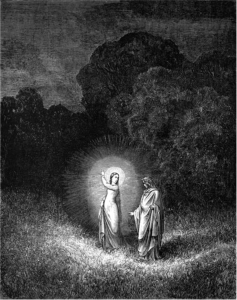
Source: Divine Comedy – Inferno by Dante Alighieri, translated by Henry Wadsworth Longfellow, illustrations by Paul Gustave Doré (https://wyomingcatholic.edu/wp-content/uploads/dante-01-inferno.pdf)
- The action of the poem begins on Good Friday of the year 1300, at which time Dante, who was born in 1265, had reached the middle of the Scriptual threescore years and ten. It ends on the first Sunday after Easter, making in all ten days. ↵
- The dark forest of human life, with its passions, vices, and perplexities of all kinds; politically the state of Florence with its fractions Guelf and Ghibelline. ↵
- Bunyan, in his Pilgrim’s Progress, which is a kind of Divine Comedy in prose, says: “I beheld then that they all went on till they came to the foot of the hill Difficulty... But the narrow way lay right up the hill, and the name of the going up the side of the hill is called Difficulty... They went then till they came to the Delectable Mountains, which mountains belong to the Lord of that hill of which we have spoken before.” ↵
- Bunyan, Pilgrim’s Progress – “But now in this valley of Humiliation poor Christian was hard put to it; for he had gone but a little way before he spied a foul fiend coming over the field to meet him; his name is Apollyon. Then did Christian begin to be afraid, and to cast in his mind whether to go back or stand his ground. ...Now at the end of this valley was another, called the valley of the Shadow of Death; and Christian must needs go through it, because the way to the Celestial City lay through the midst of it.” ↵
- The sun, with all its symbolical meanings. This is the morning of Good Friday. In the Ptolemaic system the sun was one of the planets. ↵
- The deep mountain tarn of his heart, dark with its own depth, and the shadows hanging over it. ↵
- Jeremiah ii. 6: “That led us through the wilderness, through a land of deserts and of pits, through a land of drought, and of the shadow of death, through a land that no man passed through, and where no man dwelt.” In his note upon this passage Mr. Wright quotes Spenser’s lines, Faerie Queene, I. v. 31, – “there creature never passed That back returned without heavenly grace.” ↵
- Climbing the hillside slowly, so that he rests longest on the foot that is lowest. ↵
- Jeremiah v. 6: “Wherefore a lion out of the forest shall slay them, a wolf of the evening shall spoil them, a leopard shall watch over their cities: every one that goeth out thence shall be torn in pieces.” ↵
- Wordly Pleasure; and politically Florence, with its factions of Bianchi and Neri. ↵
- Piu` volte volto. Dante delights in a play upon words as much as Shakespeare. ↵
- The stars of Aries. Some philosophers and fathers think the world was created in Spring. ↵
- Ambition; and politically the royal house of France. ↵
- Some editions read temesse, others tremesse. ↵
- Avarice; and politically the Court of Rome, or temporal power of the Popes. ↵
- Dante as a Ghibelline and Imperialist is in opposition to the Guelfs, Pope Boniface VIII., and the King of France, Philip the Fair, and is banished from Florence, out of the sunshine, and into “the dry wind that blows from dolorous poverty.” Cato speaks of the “silent moon” in De Re Rustica, XXIV., Evehito luna silenti; and XL., Vites inseri luna silenti. Also Pliny, XVI. 39, has Silens luna; and Milton, in Samson Agonistes, “Silent as the moon.” ↵
- The long neglect of classic studies in Italy before Dante’s time. ↵
- Born under Julius Caesar, but too late to grow up to manhood during his Imperial reign. He florished later under Augustus. ↵
- In this passage Dante but expresses the universal veneration felt for Virgil during the Middle Ages, and especially in Italy. Petrarch’s copy of Virgil is still preserved in the Ambrosian Library at Milan; and at the beginning of it he has recorded in a Latin note the time of his first meeting with Laura, and the date of her death, which, he says, “I write in this book, rather than elsewhere, because it comes often under my eye.” In the popular imagination Virgil became a mythical personage and a mighty magician. See the story of Virgilius in Thom’s Early Prose Romances, II. Dante selects him for his guide, as symbolizing human science or Philosophy. “I say and affirm,” he remarks, Convito, V. 16, “that the lady with whom I became enamored after my first love was the most beautiful and modest daughter of the Emperor of the Universe, to whom Pythagoras gave the name of Philosophy.” ↵
- Dante seems to have been already conscious of the fame which his Vita Nuova and Canzoni had given him. ↵
- The greyhound is Can Grande della Scala, Lord of Verona, Imperial Vicar, Ghibelline, and friend of Dante. Verona is between Feltro in the Marca Trivigiana, and Montefeltro in Romagna. Boccaccio, Decameron, I. 7, peaks of him as “one of the most notable and magnificant lords that had been known in Italy, since the Emperor Frederick the Second.” To him Dante dedicated the Paradiso. Some commentators think the Veltro is not Can Grande, but Ugguccione della Faggiola. See Troya, Del Veltro Allegorico di Dante. ↵
- The plains of Italy, in contradistinction to the mountains; the Humilemque Italiam of Virgil, Æneid, III. 522: “And now the stars being chased away, blushing Aurora appeared, when far off we espy the hills obscure, and lowly Italy.” ↵
- I give preference to the reading, Di quegli antichi spiriti dolenti. ↵
- Beatrice. ↵
- Dante, Convito III. 2, says: “Man is called by philosophers the divine animal.” ↵
- Æneas, founder of the Roman Empire. Virgil, Æneid, B. VI. ↵
- “That is,” says Boccaccio, Comento, “St. Peter the Apostle, called the greater on ac- count of his papal dignity, and to distinguish him from many other holy men of the same name.” ↵
- Shakespear, Macbeth, IV. i: “The flighty purpose never is o’ertook, Unless the deed go with it.” ↵
- Suspended in Limbo; neither in pain nor in glory. ↵
- Brighter than the star; than “that star which is brightest,” comments Boccaccio. Oth- ers say the Sun, and refer to Dante’s Canzone, beginning: “The star of beauty which doth measure time, The lady seems, who has enamored me, Placed in the heaven of Love.” ↵
- Shakespeare, King Lear, V. 3: – “Her voice was ever soft, Gentle, and low; an excellent thing in woman.” ↵
- This passage will recall Minerva transmitting the message of Juno to Achilles, Iliad, II.: “Go thou forthwith to the army of the Achæans, and hesitate not, but restrain each man with thy persuasive words, nor suffer them to drag to the sea their double-oared ships.” ↵
- Beatrice Portinari, Dante’s first love, the inspiration of his song and in his mind the symbol of the Divine. He says of her in the Vita Nuova: – “This most gentle lady, of whom there has been discourse in what precedes, reached such favour among the people, that when she passed along the way persons ran to see her, which gave me wonderful delight. And when she was near any one, such modesty took possession of his heart, that he did not dare to raise his eyes or to return her salutation; and to this, should any one doubt it, many, as having experienced it, could bear witness for me. She, crowned and clothed with humility, took her way, displaying no pride in that which she saw and heard. Many, when she had passed said, ‘This is not a woman, rather is she one of the most beautiful angels of heaven.’ Others said, ‘She is a miracle. Blessed be the Lord who can perform such a marvel.’ I say, that she showed herself so gentle and so full of all beauties, that those who looked on her felt within themselves a pure and sweet delight, such as they could not tell in words.” – C.E. Norton, The New Life, 51, 52. ↵
- The heaven of the moon, which contains or encircles the earth. ↵
- The ampler circles of Paradise. ↵
- Divine Mercy. ↵
- St Lucia, emblem of enlightening Grace. ↵
- Rachel, emblem of Divine Contemplation. See Par. XXXII. 9. ↵
- Beside that flood, where ocean has no vaunt; “That is,” says Boccacio, Comento, “the sea cannot boast of being more impetuous or more dangerous than that.” ↵